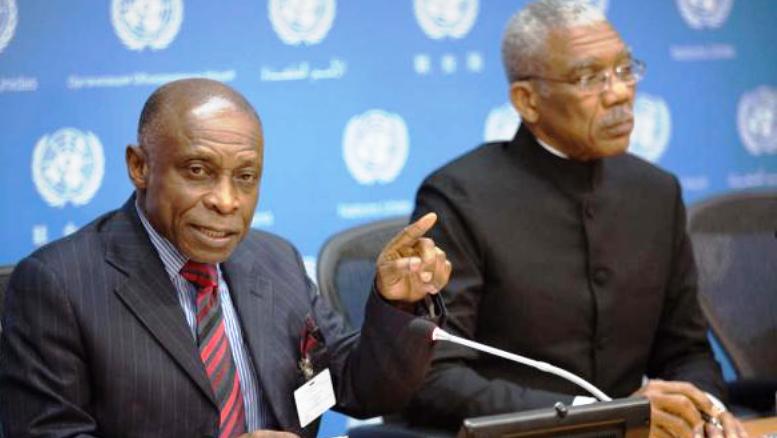 Now that the Diplomatic hurdles have been vaulted and Presidents Granger (Guyana) and Maduro (Venezuela) have agreed that the countries’ relationship is healthy enough to exchange ambassadors, we can try to figure out why Guyana would choose to bring an ambassador out of retirement to go to Venezuela.
Now that the Diplomatic hurdles have been vaulted and Presidents Granger (Guyana) and Maduro (Venezuela) have agreed that the countries’ relationship is healthy enough to exchange ambassadors, we can try to figure out why Guyana would choose to bring an ambassador out of retirement to go to Venezuela.
What are they looking for? Why would they be comfortable with offering us an ambassador who retired from the diplomatic service several years ago, knowing that the diplomatic circuit needs operatives with experience that is current ?
Maybe we should start with the available talent then work our way forward.
But, before we do, let’s stipulate that Ms. Miles has a Curriculum Vitae that, undoubtedly, qualifies her for the job and because she was Director General of the Ministry of Foreign Affairs, a position that denotes that its head has, as a minimum, overall understanding of all of the countries that Guyana has diplomatic relations with, this may be a good base assessment to determine qualification.
It may be a good thing, too, to be reminded that there are some virtues that may stimulate selection. It was Raphael Trotman, after his appointment as Minister of Governance, who said that Carolyn Birkett was a Minister he admired because of her grace and panache; that she had ‘re-positioned’ Guyana’s image, a Minister who could play “an important role in the APNU/AFC government”.
So, that inflames the curiosity as to why she was not named as ambassador to Venezuela.
According to several experts and specifically, Dennis C. Jet, former US Ambassador with a thirty year Diplomatic tenure and retired Professor of Diplomatic Affairs at Penn State University, Pennsylvania, USA, there are two distinct ways, that ambassadors receive their appointments. One way, the traditional way, is through working their way up the foreign service ladder; serving in non exotic appointments in uncomfortable enclaves and amongst people whose language is a mystery, and the other is by gratuitous appointment because of political affiliation or the need to make a political statement – like appointing an Indigenous Guyanese whose only ‘foreign’ exposure, was having gone to school in Canada, to head the country’s Foreign Service.
There is no question that Ms. Birkett’s appointment to Minister of Foreign Affairs was a result of political largesse. She was not qualified for the position at all and in the history of the Foreign Service, may well be the Minister who was least qualified to be at the helm; even with her panache and grace and re-positioning mojo. She was the appointee of a government that was so lawless that it broke its own rules and though Ms. Birkett may have been the one decent person in their Administration, the fact that she accepted a job that she knew she was not qualified to execute, grates against her decency, even if she thought she was serving her country and showed some ease, to her credit, at learning on the job.
There are some who may argue that the Minister of Foreign Affairs is a political appointment but there was a time when those appointments reflected knowledge and were made with the express intention of propelling the country forward. We can recall with pride those who walked so sure-footedly before Ms. Birkett – unquestionably erudite, bringing that mix of elegance and mastery to the portfolio that made it difficult for Guyana to be seen as anything but an emerging nation with a hand on its resources – Forbes Burnham, Shridhath Ramphal, Frederick Wills, Rashleigh Jackson, Desmond Hoyte, Rudy Insanally, Cheddi Jagan Snr. – all distinguished, appropriately qualified for the job;
… then follow the trajectory downwards after shoving Clement Rohee into that position; shove because he was never a flush fit, neither qualified nor refined to negotiate business above street level; whose only association with the word foreign was that he had studied in Prague, Czechoslovakia – another questionable item in his asset portfolio.
Maybe this is why Mr. Trotman said Ms. Birkett restored grace to the title – having replaced Clement Rohee whose appearance at a podium was always an anxious moment for those of us whom he represented; with his inartful articulation and brusque demeanor; fit more for a bouncer in a ‘B’ rated movie than an emissary of diplomacy.
Nevertheless, as servile as she may have been, Ms. Birkett had no working knowledge of the ministry, did not start from the ground up like Ms. Miles nor did she ever serve at the Ambassadorial level in any foreign country.
What she had was a Director General, Elisabeth Harper who, at the time of Ms. Birkett’s appointment, had a thirty two year head start in foreign affairs and diplomacy, service in several directorial and counselor positions and who had strategic knowledge of dealing with Brazil, Venezuela and Suriname, having headed both the Frontiers Division and directed the department of Americas for a combined total of six years.
So, it is by this process of elimination that we can remove possible contenders; this process of matching resumes to experience, which disqualifies Minister Birkett and which does not include Elisabeth Harper, Former Foreign Affairs Director General from 2001 to 2015, Director Department of the Americas and Asia 1996 -2001, Counsellor Guyana High Commission, London 1991 – 1995 Head, Foreign Affairs Frontiers Division 1990 -1991, Foreign Service Officer III Political Division I (Latin America and the Caribbean) Ministry of Foreign Affairs 1986 – 1989 , Foreign Service Officer II (Protocol) Protocol Division Ministry of Foreign Affairs 1980 – 1981,Foreign Service Officer I Administration Division Ministry of Foreign Affairs 1979 – 1980 and who was the honored recipient of The Golden Arrow of Achievement (A.A.) conferred in October 2011 for long, dedicated and distinguished service in the Guyana Foreign Service, to add to her Bachelors Arts, (Hons) French and Spanish, with working conversational fluency, amongst other certificates and diplomas of industry knowledge.
This is a resume that does not only stand up but stands out for a position to serve in our country’s Foreign Service but the Coalition Government continues to deselect Mrs. Harper; continues to treat her like she is from the political tribe of the leper Naaman; reaching way in to their bag to retrieve servants from times long gone because she exercised her constitutional right to run for office on the ticket of the Opposition.
There was lots of talk of a Granger doctrine enshrined in inclusive governance; molded off of the Westminster Model which holds that participation of the Opposition as critical to successful governance of the country.
It can’t stop with the Coalition and with the appointment of the Prime Minister and Minister of Home Affairs, neither can it stop with the inclusion of certain personnel who chose to take to the airwaves to renounce political affiliation, real or perceived.
Inclusive governance recruits those who possess the knowledge, experience, exposure, ability and willingness to work towards the improvement of a country.
So far, no one from the Coalition has explained why the accomplished, former Director General of Ministry of Foreign Affairs, Elisabeth Harper, remains sidelined by this administration that professes inclusive governance.
No one.



Re: Bravo Ms. Barker!!!. you have inspired me to begin responding to the malicious and hyprocritivcal words and writings of the current opposition members especially Bharrat Jagdeo. He has presided over the fastest and greatest degradation of a society on the western hemisphere with his racial vitriol and pseudo economics of deception. Thank you. Freddie Shivdat.